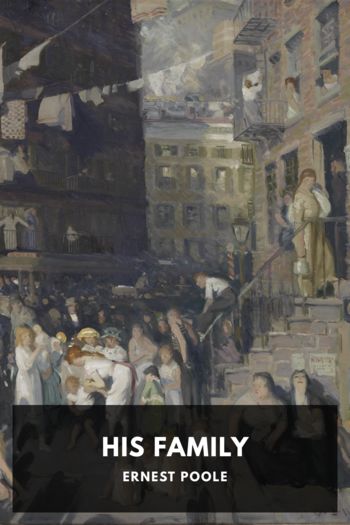His Family - Ernest Poole (ereader for comics .txt) 📗

- Author: Ernest Poole
Book online «His Family - Ernest Poole (ereader for comics .txt) 📗». Author Ernest Poole
And she had asked him to promise her that.
But he had not kept his promise. For after Judith’s dying he had felt himself terribly alone, with eternity around him, his wife slipping far away. And the universe had grown stark and hard, impersonal, relentless, cold. A storm of doubts had attacked his faith. And though he had resisted long, for his faith in God had been rooted deep in the mountains of New England, in the end it had been wrenched away, and with it he had lost all hope that either for Judith or himself was there any existence beyond the grave. So death had come to Roger’s soul. He had been deaf and blind to his children. Nights by the thousand spent alone. Like a gray level road in his memory now was the story of his family.
When had his spirit begun to awaken? He could not tell, it had been so slow. His second daughter, Deborah, who had stayed at home with her father when Laura had gone away to school, had done little things continually to rouse his interest in life. Edith’s winsome babies had attracted him when they came to the house. Laura had returned from school, a joyous creature, tall and slender, with snapping black eyes, and had soon made her presence felt. One day in the early afternoon, as he entered the house there had burst on his ears a perfect gale of laughter; and peering through the portières he had seen the dining room full of young girls, a crew as wild as Laura herself. Hastily he had retreated upstairs. But he had enjoyed such glimpses. He had liked to see her fresh pretty gowns and to have her come in and kiss him good night.
Then had come a sharp heavy jolt. His business had suffered from long neglect, and suddenly for two anxious weeks he had found himself facing bankruptcy. Edith’s husband, a lawyer, had come to his aid and together they had pulled out of the hole. But he had been forced to mortgage the house. And this had brought to a climax all the feelings of guiltiness which had so long been stirring within him over his failure to live up to the promise he had made his wife.
And so Roger had looked at his children.
And at first to his profound surprise he had had it forced upon him that these were three grown women, each equipped with her own peculiar feminine traits and desires, the swift accumulations of lives which had expanded in a city that had reared to the skies in the many years of his long sleep. But very slowly, month by month, he had gained a second impression which seemed to him deeper and more real. To the eye they were grown women all, but inwardly they were children still, each groping for her happiness and each held back as he had been, either by checks within herself or by the gay distractions of the absorbing city. He saw each of his daughters, parts of himself. And he remembered what Judith had said: “You will live on in our children’s lives.” And he began to get glimmerings of a new immortality, made up of generations, an endless succession of other lives extending into the future.
Some of all this he remembered now, in scattered fragments here and there. Then from somewhere far away a great bell began booming the hour, and it roused him from his revery. He had often heard the bell of late. A calm deep-toned intruder, it had first struck in upon his attention something over two years ago. Vaguely he had wondered about it. Soon he had found it was on the top of a tower a little to the north, one of the highest pinnacles of this tumultuous modern town. But the bell was not tumultuous. And as he listened it seemed to say, “There is still time, but you have not long.”
Edith, sitting opposite him, looked up at the sound with a stir of relief. Ten o’clock. It was time to go home.
“I wonder what’s keeping Bruce,” she said. Bruce was still in his office downtown. As a rule on Friday evenings he came with his wife to supper here, but this week he had some new business on hand. Edith was vague about it. As she tried to explain she knitted her brows and said that Bruce was working too hard. And her father grunted assent.
“Bruce ought to knock off every summer,” he said, “for a good solid month, or better two. Can’t you bring him up to the mountains this year?” He referred to the old New Hampshire home which he had kept as a summer place. But Edith smiled at the idea.
“Yes, I could bring him,” she replied, “and in a week he’d be perfectly crazy to get back to his office again.” She compressed her lips. “I know what he needs—and we’ll do it some day, in spite of him.”
“A suburb, eh,” her father said, and his face took on a look of dislike. They had often talked of suburbs.
“Yes,” his daughter answered, “I’ve picked out the very house.” He threw at her a glance of impatience. He knew what had started her on this line. Edith’s friend, Madge Deering, was living out in Morristown. All very well, he reflected, but her case was not at all the same. He had known Madge pretty well. Although the death of her husband had left her a widow at twenty-nine, with four small daughters to bring up, she had gone on determinedly. Naturally smart and able, Madge was always running to town, keeping up with all her friends and with every new fad and movement there, although she made fun of most of them. Twice she had taken her girls abroad. But Edith was quite different. In a suburb she would draw into her house and never grow another inch. And Bruce, poor devil, would commute and take





Comments (0)